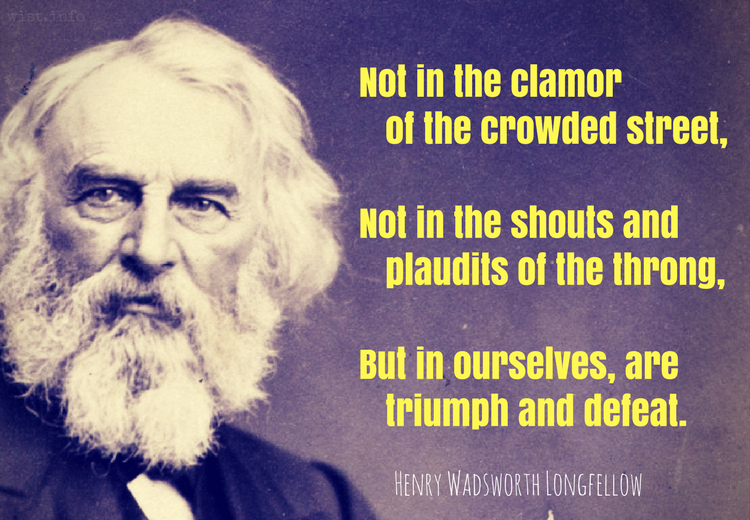There is nothing which a prudent man must shun more carefully than living with a view to popularity and giving serious thought to the things esteemed by the multitude, instead of making sound reason his guide of life, so that, even if he must gainsay all men and fall into disrepute and incur danger for the sake of what is honourable, he will in no wise choose to swerve from what has been recognized as right.
[ἀλλ᾽ οὐκ ἔστιν ὃ μᾶλλον φευκτέον τῷ σωφρονοῦντι, τοῦ πρὸς δόξαν ζῆν, καὶ τὰ τοῖς πολλοῖς δοκοῦντα περισκοπεῖν, καὶ μὴ. τὸν ὀρθὸν λόγον ἡγεμόνα ποιεῖσθαι τοῦ βίου, ὥστε, κἂν πᾶσιν ἀνθρώποις ἀντιλέγειν, κἂν ἀδοξεῖν καὶ κινδυνεύειν ὑ ὑπὲρ τοῦ καλοῦ δέῃ, μηδὲν αἱρεῖσθαι τῶν ὀρθῶς ἐγνωσμένων παρακινεῖν.]
Basil of Caesarea (AD 330-378) Christian bishop, theologian, monasticist, Doctor of the Church [Saint Basil the Great, Ἅγιος Βασίλειος ὁ Μέγας]
Address to Young Men on Reading Greek Literature, ch. 9, sec. 25 [tr. Deferrari/McGuire (1933)]
(Source)
Quotations about:
popularity
Note not all quotations have been tagged, so Search may find additional quotes on this topic.
To found the reward for virtuous actions on the approval of others is to choose too uncertain and shaky a foundation. Especially in an age as corrupt and ignorant as this, the good opinion of the people is a dishonor. Whom can you trust to see what is praiseworthy?
[De fonder la recompence des actions vertueuses, sur l’approbation d’autruy, c’est prendre un trop incertain et trouble fondement, signamment en un siecle corrompu et ignorant, comme cettuy cy la bonne estime du peuple est injurieuse. A qui vous fiez vous, de veoir ce qui est louable?]Michel de Montaigne (1533-1592) French essayist
Essays, Book 3, ch. 2 “Of Repentence [Du Repentir]” (1586) (3.2) (1595) [tr. Frame (1943)]
(Source)
This essay first appeared in the 1588 ed. The second sentence/phrase (on the age being so corrupt) and following were added for the 1595 ed.
(Source (French)). Alternate translations:
To ground the recompence of vertuous actions, upon the approbation of others, is to undertake a most uncertaine or troubled foundation, namely in an age so corrupt and times so ignorant, as this is: the vulgar peoples good opinion is injurious. Whom trust you in seeing what is commendable?
[tr. Florio (1603)]
To ground the Recompence of virtuous Actions upon the Approbation of others, is too uncertain and unsafe a Foundation; especially in so corrupt and ignorant an Age as this, the good Opinion of the Vulgar is injurious. Upon whom do you relie to shew you what is recommendable?
[tr. Cotton (1686)]
To ground the recompense of virtuous actions upon the approbation of others is too uncertain and unsafe a foundation, especially in so corrupt and ignorant an age as this, wherein the good opinion of the vulgar is injurious: upon whom do you rely to show you what is recommendable?
[tr. Cotton/Hazlitt (1877)]
To base the reward of virtuous actions on the approbation of others is to choose a too uncertain and obscure foundation. Especially in a corrupt and ignorant age like this, the good opinion of the vulgar is offensive; to whom do you trust to perceive what is praiseworthy?
[tr. Ives (1925)]
Basing the recompense of virtuous deeds on another’s approbation is to accept too uncertain and confused a foundation -- especially since in a corrupt and ignorant period like our own to be in good esteem with the masses is an insult: whom would you trust to recognize what was worthy of praise!
[tr. Screech (1987)]
Popularity is the easiest thing in the world to gain and it is the hardest thing to hold.
But if you have a fear of unpopularity, is that arising from the imputation of vigour and boldness, or that arising from that of inactivity and indecision most to be feared? When Italy is laid waste by war, when cities are attacked and houses in flames, do you not think that you will be then consumed by a perfect conflagration of hatred?
[Sed si quis est invidiae metus, non1 est vehementius severitatis ac fortitudinis invidia quam inertiae ac nequitiae pertimescenda. An, cum bello vastabitur Italia, vexabuntur urbes, tecta ardebunt, tum te non existimas invidiae incendio conflagraturum]
Marcus Tullius Cicero (106-43 BC) Roman orator, statesman, philosopher
Orationes in Catilinam [Catilinarian Orations], No. 1, § 11, cl. 29 (1.11.29) (63-11-08 BC) [tr. Yonge (1856)]
(Source)
Speaking (aloud, rhetorically) to himself about his concerns of public reaction to his acting so passionately against Cataline's conspiracy.
(Source (Latin)). Alternate translations:
But if there be any fear of Envy, is the Censure of Severity and Courage more greatly to be feared, than that of Baseness and Cowardise? Do you not think, when Italy shall be made desolate with War, the Cities plundered, the Houses a-fire, you shall then fall under a flagrant Envy?
[tr. Wase (1671)]
If fear is to operate, which do you think is most to be dreaded, reproach for cowardice, or censure for magnanimity? When Italy is laid waste; when her cities are taken by storm; when her temples and mansions are wrapt in flames; it is then your danger will begin; it is then that the clamours of mankind will be loud against you.
[tr. Sydney (1795)]
But if there is any fear of odium, whether should the odium resulting from severity and determinati0on be dreaded more violently than that of indolence and wickedness? Whether, when Italy shall be ravaged by war, when the cities shall be harassed, when roofs shall be burning, dost thou not think that thou then will burn with a conflagration of odium?
[tr. Mongan (1879)]
But if there is any fear of envy (displeasure), whether is the envy of severity and of fortitude to be feared more violently, than (that) of inactivity and of negligence? Whether, when Italy shall be devastated with war, cities shall be burned, roofs (houses) shall be on fire: dost thou think thyself not (to be) about to burn then with a conflagration of envy (unpopularity)?
[tr. Underwood (1885)]
But if there is any fear of ill will, is the ill will because of strictness and courage to be feared more strongly, than (that) because of inactivity and negligence? When Italy shall be devastated with war, cities shall be harassed, roofs [houses] shall burn: do you think (you) yourself will not (about to) be consumed then with a conflagration of ill will?
[tr. Dewey (1916)]
If the question of inviting disapproval arises at all, the unpopularity resulting from firmness and determination is no more to be dreaded than the opprobrium produced by culpable failure to act. For when Italy is to be ravaged by war, when cities are assaulted and houses gutted by fire, do you not see how utterly the flames of hatred will consume you then?
[tr. Grant (1960)]
But if there is any fear of hatred, it is not hatred of harshness and firmness requiring to be feared more violently than (hatred) of idleness and worthlessness. Or when Italy is laid waste to, the cities will be harassed, the buildings will burn, then do you not think that you will be consumed by burning hatred?
[IB Notes]
Language doesn’t belong to grammarians, linguists, wordsmiths, writers, or editors. It belongs to the people who use it. It goes where people want it to go, and, like a balky mule, you can’t make it go where it doesn’t want to go.
Rosalie Maggio (1944-2021) American writer
Talking About People: A Guide to Fair and Accurate Language, “Writing Guidelines” (1997)
(Source)
The writer who considers only the taste of his own time is concerned more with his personal fame than with that of his books: we should always aim at perfection, and then we shall receive from posterity that justice which our contemporaries sometimes deny us.
[Celui qui n’a égard en écrivant qu’au goût de son siècle songe plus à sa personne qu’à ses écrits: il faut toujours tendre à la perfection, et alors cette justice qui nous est quelquefois refusée par nos contemporains, la postérité sait nous la rendre.]
Jean de La Bruyère (1645-1696) French essayist, moralist
The Characters [Les Caractères], ch. 1 “Of Works of the Mind [Des Ouvrages de l’Esprit],” § 67 (1.67) (1688) [tr. Stewart (1970)]
(Source)
(Source (French)). Alternate translations:
He who regards nothing more in his Works than the taste of the Age, has a greater value for his Person than his Writings: He should always aim at Perfection; and tho his Contemporaries refuse him Justice, Posterity will give it him.
[Bullord ed. (1696)]
He who regards nothing more in his Works than the Taste of his own Age, Considers his Person more than his Writings: He should always aim at Perfection, and tho his Contemporaries refuse him Justice, Posterity will give it him.
[Curll ed. (1713)]
He who regards nothing more in his Works than the Taste of the Age, has a greater value for his Person than his Writings: He should always aim at Perfection; and though his Cotempararies refuse him Justice, he will be better used by Posterity.
[Browne ed. (1752)]
He who only writes to suit the taste of the age, considers himself more than his writings. We should always aim at perfection, and then posterity will do us that justice which sometimes our contemporaries refuse.
[tr. Van Laun (1885)]
We pursued an empty fame and popularity even down to the applause of the playhouse, poetical competitions, and contests for garlands of grass, foolish plays on the stage, and unbridled lusts.
[Hac popularis gloriae sectantes inanitatem, usque ad theatricos plausus et contentiosa carmina et agonem coronarum faenearum et spectaculorum nugas et intemperantiam libidinum]
Augustine of Hippo (354-430) Christian church father, philosopher, saint [b. Aurelius Augustinus]
Confessions, Book 4, ch. 1 / ¶ 1 (4.1.1) (c. AD 398) [tr. Ryan (1960)]
(Source)
(Source (Latin)). Alternate translations:
Hunting after the emptiness of popular praise, down even to theatrical applauses, and poetic prizes, and strifes for grassy garlands, and the follies of shows, and the intemperance of desires.
[tr. Pusey (1838)]
Striving after the emptiness of popular fame, even to theatrical applauses, and poetic contests, and strifes for grassy garlands, and the follies of shows and the intemperance of desire.
[tr. Pilkington (1876)]
Vain seeking the emptiness of popular praise, even the applause of the theatres , and the prizes for verses, and the struggle for withering garlands, and the follies of shows, and the gratification of ungoverned desires.
[tr. Hutchings (1890)]
Education drew me to follow the toys that men call fame, applause in the theatre, prize poems, contests for crowns of hay, the follies of the stage, all the riot of passion.
[tr. Bigg (1897)]
I pursued the emptiness of popular glory and the applause of spectators, with competition for prize poems and strife for garlands of straw and the vanity of stage shows and untempered lusts.
[tr. Sheed (1943)]
In my public life I was striving after the emptiness of popular fame, going so far as to seek theatrical applause, entering poetic contests, striving for the straw garlands and the vanity of theatricals and intemperate desires.
[tr. Outler (1955)]
We would hunt for worthless popular distinctions, the applause of an audience, prizes for poetry, or quickly fading wreaths won in competition. We loved the idle pastimes of the stage and in self-indulgence we were unrestrained.
[tr. Pine-Coffin (1961)]
I and my friends would be hunting after the empty show of popularity -- theatrical applause from the audience, verse competitions, contests for crowns of straw, the vanity of the stage, immoderate lusts.
[tr. Warner (1963)]
I would be seeking empty popularity, cheers in the theatre, poetic competitions, strife for straw crowns, trifles of stage shows, and undisciplined desires.
[tr. Blaiklock (1983)]
We pursued trumpery, popular acclaim, theatrical plaudits, song-competitions and the contest for ephemeral wreaths, we watched trashy shows and indulged our interperate lusts.
[tr. Boulding (1997)]
Some new path must be tried if ever I,
With wing uplifted from the level ground.
May on the public voice triumphant rise.[Tentanda via est, qua me quoque possim
Tollere humo victorque virum volitare per ora.]Virgil (70-19 BC) Roman poet [b. Publius Vergilius Maro; also Vergil]
Georgics [Georgica], Book 3, l. 8ff (3.8-9) (29 BC) [tr. Williams (1915)]
(Source)
The poet's ambition. Often quoted as Alia tentanda via est ("Another way must be tried"). (Source (Latin)). Alternate translations:
To raise my self a way must now be found,
That through all Nations I may be renown'd.
[tr. Ogilby (1649)]
New ways I must attempt, my groveling Name
To raise aloft, and wing my flight to Fame.
[tr. Dryden (1709), ll. 13-14]
I too from earth to lift myself will try,
And on the wings of Fame adventurous fly
[tr. Nevile (1767), ll. 11-12]
I too will boldly strive my flight to raise,
And, wing'd by victory, catch the gale of praise.
[tr. Sotheby (1800)]
I, too, must attempt a way, whereby I may raise myself from the gorund, and victorious hover through the lips of men.
[tr. Davidson (1854)]
Some way I must outstrive,
To lift me also from the ground, and then
A flight of triumph on the lips of men!
[tr. Blackmore (1871), l. 10ff]
I must essay a course by which I may raise myself, like other poets, from the lowly ground, and ride triumphant on the lips of men.
[tr. Wilkins (1873)]
Needs must a path be tried,
By which I too may lift me from the dust,
And float triumphant through the mouths of men.
[tr. Rhoades (1881), ll. 11-13]
Be mine the glory to ascend to fame
By paths untrodden.
[tr. King (1882)]
I must try a course whereby I also may soar aloft and hover victorious before the eyes of men.
[tr. Bryce (1897)]
A path must be adventured where I too may rise from earth and fly triumphing on the lips of men.
[tr. Mackail (1899)]
A path will I try that shall lift me above
This earth, and from lip to lip of men my triumphant flight
Will I wing.
[tr. Way (1912)]
I must essay a path whereby I, too, may rise from earth and fly victorious on the lips of men.
[tr. Fairclough (Loeb) (1916)]
No, I must venture a theme will exalt me
From earth and give me wings and a triumph on every tongue.
[tr. Day-Lewis (1940)]
I must find a way to soar aloft
And raise my verse above this common soil,
To fly victorious on the lips of men.
[tr. Bovie (1956)]
I must find a way to raise myself from the earth and fly victorious, my name on the lips of men.
[tr. Miles (1980)]
I must find a way
Of my own to soar above the common ground
And "fly victorious on the lips of men."
[tr. Wilkinson (1982)]
I must try a path, by which I too
can rise from the earth and fly, victorious, from men’s lips.
[tr. Kline (2001)]
I must try for a new path on which I may rise from the earth and soar triumphant from the lips of men.
[tr. Lembke (2004)]
I must essay a path by which I too
may rise from earth a triumph fluttering on the lips of men.
[tr. Johnson (2009)]
I too must find
The way to rise in flight above the earth,
Triumphant on the speech of men.
[tr. Ferry (2015)]
Nothing is meaner, and more typical of the mob, than to speak in glowing terms of those whom one held in little account before their rise to eminence.
[Il n’y a rien de plus bas, et qui convienne mieux au peuple, que de parler en des termes magnifiques de ceux mêmes dont l’on pensait très modestement avant leur élévation.]
Jean de La Bruyère (1645-1696) French essayist, moralist
The Characters [Les Caractères], ch. 12 “Of Opinions [Des Jugements],” § 5 (12.5) (1688) [tr. Stewart (1970)]
(Source)
(Source (French)). Alternate translations:
There's nothing so mean, and so like the Mob, as to talk much in the praise of those very persons, of whom we thought indifferently before their promotion.
[Bullord ed. (1696)]
There is nothing so mean and so like the Vulgar, as to talk much in praise of those very Persons, of whom we thought indifferently before their promotion.
[Curll ed. (1713)]
There's nothing so mean, and so truly vulgar, as to sound the Praise of those very Persons, of whom we thought but indifferently before their Promotion.
[Browne ed. (1752)]
There is nothing so mean and so truly vulgar as extravagantly to praise those very persons of whom we had but very indifferent opinions before their promotion.
[tr. Van Laun (1885)]
Well, you know how Congress is. They’ll vote for anything if the thing they vote for will turn around and vote for them.
A statesman is a man that can do what the politician would like to do but can’t, because he is afraid of not being elected.
I never saw, heard, nor read, that the clergy were beloved in any nation where Christianity was the religion of the country. Nothing can render them popular, but some degree of persecution.
For tho’ it is certainly more laudable, and a thing of greater moment, to be generous, constant, and magnanimous, than merely to be polite and well bred; yet we find, from daily experience, that sweetness of manners, a genteel carriage, and, polite address are frequently of more advantage to those who are so happy as to be possessed of them, than any greatness of soul or brightness of parts are to those who are adorned with those more shining talents.
[E come che l’esser liberale o constante o magnanimo sia per sé sanza alcun fallo più laudabil cosa e maggiore che non è l’essere avenente e costumato, non di meno forse che la dolcezza de’ costumi e la convenevolezza de’ modi e delle maniere e delle parole giovano non meno a’ possessori di esse che la grandezza dell’animo e la sicurezza altresì a’ loro possessori non fanno.]
Giovanni della Casa (1503-1556) Florentine poet, author, diplomat, bishop
Galateo: Or, A Treatise on Politeness and Delicacy of Manners [Il Galateo overo de’ costumi], ch. 1 (1558) [tr. Graves (1774)]
(Source)
(Source (Italian)). Alternate translations:
And albeit Liberalitie, or magnanimitie, of themselves beare a greater praise, then, to be a well taught or manored man: yet perchaunce, the courteous behaviour and entertainement with good maners and words, helpe no lesse, him that hath them: then the high minde and courage, advaunceth him in whome they be.
[tr. Peterson (1576)]
Although liberality, courage, or generosity are without doubt far greater and more praiseworthy things than charm and manners, none the less, pleasant habits and decorous manners and words are perhaps no less useful to those who have them than a noble spirit and self-assurance are to others.
[tr. Einsenbichler/Bartlett (1986)]
Popular success is a palace built for a writer by publishers, journalists, admirers and professional reputation makers, in which a silent army of termites, rats, dry rot and death-watch beetles are tunnelling away, till, at the very moment of completion, it is ready to fall down. The one hope for a writer is that although his enemies are often unseen they are seldom unheard. He must listen for the death-watch, listen for the faint toc-toc, the critic’s truth sharpened by envy, the embarrassed praise of a sincere friend, the silence of gifted contemporaries, the implications of the don in the manger, the visitor in the small hours. He must dismiss the builders and contractors, elude the fans with an assumed name and dark glasses, force his way off the moving staircase, subject every thing he writes to a supreme critical court. Would it amuse Horace or Milton or Swift or Leopardi? Could it be read to Flaubert? Would it be chosen by the Infallible Worm, by the discriminating palates of the dead?
Cyril Connolly (1903-1974) English intellectual, literary critic and writer.
Enemies of Promise, Part 2, ch. 15 “The Slimy Mallows” (1938)
(Source)
People are egregiously mistaken if they think they ever can attain to permanent popularity by hypocrisy, by mere outside appearances, and by disguising not only their language but their looks. True popularity takes deep root and spreads itself wide; but the false falls away like blossoms; for nothing that is false can be lasting.
[Quodsi qui simulatione et inani ostentatione et ficto non modo sermone, sed etiam voltu stabilem se gloriam consequi posse rentur, vehementer errant. Vera gloria radices agit atque etiam propagatur, ficta omnia celeriter tamquam flosculi decidunt, nee simulatum potest quicquam esse diuturnum.]
Marcus Tullius Cicero (106-43 BC) Roman orator, statesman, philosopher
De Officiis [On Duties; On Moral Duty; The Offices], Book 2, ch. 12 (2.12) / sec. 43 (44 BC) [tr. Edmonds (1865)]
(Source)
(Source (Latin)). Alternate translation:
Those people therefore are highly mistaken, who think of obtaining a solid reputation by vain shows and hypocritical pretences; by composed countenances and studied forms of words: for true glory takes deep root, and grows and flourishes more and more; but that which is only in show and mere outside, quickly decays and withers like flowers; nor can anything be lasting that is only counterfeit.
[tr. Cockman (1699)]
But if any suppose, that they can obtain a stable reputation by pretences, empty ostentation, hypocritical conversation, and even artificial looks, they are extremely mistaken. True fame takes deep root, and extends its shoots. Every counterfeit appearance, like blossoms, quickly falls off; and no pretense can be lasting.
[tr. McCartney (1798)]
If there be those who think to obtain enduring fame by dissembling and empty show, and by hypocrisy, not only of speech, but of countenance also, they are utterly mistaken. True fame strikes its roots downward, and sends out fresh shoots; all figments fall speedily, like blossoms, nor can anything feigned be lasting.
[tr. Peabody (1883)]
It is a delusion to suppose that glory can be founded on dissimulation, vain ostentation, and studied words and looks. True glory strikes root and spreads, everything unreal soon falls like the blossoms, a lie cannot last.
[tr. Gardiner (1899)]
True glory strikes roots, and grows: ill-founded reputations, like flowers, soon wither, nor can anything last long which is based on pretence.
[ed. Harbottle (1906)]
For if anyone thinks that he can win lasting glory by pretence, by empty show, by hypocritical talk and looks, he is very much mistaken. True glory strikes deep root and spreads its branches wide; but all pretences soon fall to the ground like fragile flowers, and nothing counterfeit can be lasting.
[tr. Miller (1913)]
If anyone thinks he can attain lasting glory by mimicry, by empty shows, by pretense in his looks and his conversation, he is far from correct. Genuine glory puts down roots and even sends out new growth; any pretense dies down quickly, like fragile flowers. Nothing simulated can be long-lasting.
[tr. Edinger (1974)]
His poetry seems to please the critics, and because it is plain-spoken, rhymes and scans, it pleases human beings as well.
Isaac Asimov (1920-1992) Russian-American author, polymath, biochemist
Familiar Poems Annotated, “Robert Frost, ‘Fire and Ice'” (1977)
(Source)
Popular art is normally decried as vulgar by the cultivated people of its time; then it loses favour with its original audience as a new generation grows up; then it begins to merge into the softer lighting of “quaint” and cultivated people become interested in it, and finally it begins to take on the archaic dignity of the primitive.
Northrop Frye (1912-1991) Canadian literary critic and literary theorist
Anatomy of Criticism, “Mythical Phase: Symbol as Archetype” (1957)
(Source)
Who sneers at epigrams and feigns to scout them,
Believe me, does not know a thing about them.
The real bores are the dreary epic spinners
Who rant of Tereus’ or Thyestes’ dinners,
Who rave of cunning Daedalus applying
The wings to Icarus to teach him flying,
Or else to show what dullards they esteem us
Bleat endless pastorals on Polyphemus.
My unpretentious Muse is not bombastic,
But deems these robes of Tragedy fantastic.
“Such things,” you say, “earn all men’s commendation,
As works of genius and inspiration.”
Ah, very true — those pompous classic leaders
Do get the praise — but then I get the readers![Nescit, crede mihi, quid sint epigrammata, Flacce,
Qui tantum lusus ista iocosque vocat.
Ille magis ludit, qui scribit prandia saevi
Tereos, aut cenam, crude Thyesta, tuam,
Aut puero liquidas aptantem Daedalon alas,
Pascentem Siculas aut Polyphemon ovis.
A nostris procul est omnis vesica libellis,
Musa nec insano syrmate nostra tumet.
“Illa tamen laudant omnes, mirantur, adorant.”
Confiteor: laudant illa, sed ista legunt.]Martial (AD c.39-c.103) Spanish Roman poet, satirist, epigrammatist [Marcus Valerius Martialis]
Epigrams [Epigrammata], Book 4, epigram 49 (4.49) (AD 89) [tr. Pott & Wright (1921)]
(Source)
"To Valerius Flaccus." (Source (Latin)). Alternate translations:
Flaccus thou knowest not Epigrams,
no more then babes or boyes:
Which deemst them to be nothyng els,
but sports and triflyng toyes:
He rather toyes, and sports it out,
whiche doeth in Verse recite
Fell Tereus dinner, or whiche doeth,
Thyestes supper write:
Or he whiche telles how Dedalus,
did teache his sonne to flie:
Which telleth eke of Plyphem,
the Shepheard with one eye.
From bookes of myne, are quight exempt,
all rancour, rage and gall:
No plaier in his euishe weeds,
heare prankyng see you shall:
Yet these men doe adore (thou sayest)
laude, like and love: in deed,
I graunt you sir those they do laude,
perdie but these thei reed.
[tr. Kendall (1577)]
Thou know'st not, trust me, what are Epigrams,
Flaccus, who think'st them jest and wanton games.
He wantons more, who writes what horrid meat
The plagu'd Tyestes and vex't Tereus eat,
Or Daedalus fitting is boy to fly,
Or Polyphemus' flocks in Sicily.
My booke no windy words nor turgid needes,
Nor swells my Muse with mad Cothurnall weedes.
Yet those things all men praise, admire, adore.
True; they praise those, but read these poems more.
[tr. May (1629)]
Though little know'st what epigram contains,
Who think'st it all a joke in jocund strains.
He direly jokes, who bids a Tereus dine;
Or dresses suppers like, Thyestes, thine;
Feins him who fits the boy with melting wings,
Or the sweet shepherd Polyphemus sings.
Or muse disdains by fustian to excel;
by rant to rattle, or in buskin swell.
Those strains the learn'd applaud, admire, adore.
Those they applaud, I own; but these explore.
[tr. Elphinston (1782), ep. 48]
You little know what Epigram contains,
Who deem it but a jest in jocund strains.
He rather jokes, who writes what horrid meat
The plagued Thyestes and vex't Tereus eat;
Or tells who robed the boy with melting wings;
Or of the shepherd Polyphemus sings.
Our muse disdains by fustian to excel,
By rant to rattle, or in buskins swell.
Though turgid themes all men admire, adore,
Be well assured they read my poems more.
[Westminster Review (Apr 1853)]
He knows not, Flaccus, believe me, what Epigrams really are,
who calls them mere trifles and frivolities.
He is much more frivolous, who writes of the feast of the cruel
Tereus; or the banquet of the unnatural Thyestes;
or of Daedalus fitting melting wings to his son's body;
or of Polyphemus feeding his Sicilian flocks.
From my effusions all tumid ranting is excluded;
nor does my Muse swell with the mad garment of Tragedy.
"But everything written in such a style is praised, admired, and adored by all."
I admit it. Things in that style are praised; but mine are read.
[tr. Bohn's Classical (1859)]
He does not know, believe me, what epigrams are, Flaccus,
who styles them only frivolities and quips.
He is more frivolous who writes of the meal of savage
Tereus, or of thy banquet, dyspeptic Thyestes,
or of Daedalus fitting to his son melting wings,
or of Polyphemus pasturing Sicilian sheep.
Far from poems of mine is all turgescence,
nor does my Muse swell with frenzied tragic train.
"Yet all men praise those tragedies, admire, worship them."
I grant it: those they praise, but they read the others.
[tr. Ker (1919)]
What makes an epigram he knows not best
Who deems it, Flaccus, but an idle jest.
They rather jest, who Tereus' crime indict
Or the foul banquet of Thyestes write,
Or Icarus equipped with waxen wing
Or Polyphemus and his shepherding.
No fustian ornaments my page abuse
Nor struts in senseless pomp my tragic Muse.
"Men praise," you say, "and call such verse divine."
Yes, they may praise it, but they study mine.
[tr. Francis & Tatum (1924), #188, "A Defence of Epigram"]
He does not know what epigrams
Are really meant to be
Who calls them only jests and jokes
Or comic poetry --
A dimwit dilettante's delight,
Mere vers de societé
He really is the one who jests
Who writes about the stew
Served Tereus, or that loathsome meal
Of children served to you,
Thyestes, indigestion-prone,
Of sons your brother slew.
Or Daedalus fitting Icarus
With two liquescent wings,
Or who of Polyphemus tending
Sheep in Sicily sings,
And those huge, monstrous boulders which
He at Ulysses flings.
Far from my verse is any trace
Of rank turgidity.
My Muse has never donned the robes
Of pompous tragedy.
"But that's what's praised!" But what is read?
My earthy poetry!
[tr. Marcellino (1968)]
To say that epigrams are only jokes and gags
is not to know what they are, my good friend Flaccus.
The poet is more entertaining who asks you to dine
at the cannibal board of Tereus, or describes,
oh indigestible Thyestes, your dinner party;
or the diverting poet turns your attention away
to the mythical sight of Daedalus, fittingly typed
as the one who tailored those tender wings for his son;
or wanders off with Polyphemus, the pastoral giant
pasturing preposterous sheep. Far be it from me
to enlarge on the standard rhetorical situation
and wax eloquent in the interests of inflation.
Our Muse makes no use of the billowing robes
that stalk the figures of Tragedy. "But those poems
are what everyone praises and adores."
I admit it, they praise them, but they read ours.
[tr. Bovie (1970)]
Who deem epigrams mere trifles,
Flaccus, know not epigram.
He trifles who describes the meal
wild Tereus, rude Thyestes ate,
The Cretan Glider moulting wax,
the one-eyed shepherd herding sheep.
Foreign to my verse the tragic sock,
it's turgid, ranting rhetoric.
"Men praise -- esteem -- revere these works."
True: them they praise ... while reading me.
[tr. Whigham (1987)]
Anybody who calls them just frivolities and jests, Flaccus, doesn't know what epigrams are, believe me. More frivolous is the poet who writes about the meal of savage Tereus or your dinner, dyspeptic Thyestes, or Daedalus fitting his boy with liquid wings, or Polyphemus feeding Sicilian sheep. All bombast is far from my little books, neither does my Muse swell with tragedy's fantastic robe. "And yet all the world praises such things and admires and marvels." I admit it: that they praise, but this they read.
[tr. Shackleton Bailey (1993)]
Quite clueless, Flaccus, all these sorry folks
Who brand short poems mere badinage and jokes.
Want to know who's more idle? The big boys,
Our Epic Poets, who rehearse the joys
Of serving human flesh up à la carte --
Tereus' bloody banquet or the huge tart
Chez Thyestes ("It's a little gristly!").
Or they serve us crap, like how remissly
Daedalus made -- with wax, imagine! -- wings
For his poor doomed son. Then Big Epic sings
Of arms and the -- not "man" -- one-eyed giant?
Polyphemus: his brain was far from pliant,
So Homer made him watch sheep in Sicily.
Pardon me for carping so pissily,
Flaccus, at insults to my epigrams,
So far from the bloated whimsy that crams
Our big-assed epics. All men blare in praise
of these "classics," you say, and bask in their rays.
I will not disagree, but mark my word:
Some day, far off, a wise man will be heard
To say, "Classics we all want to have read,
Never to read." My books get read instead!
[tr. Schmidgall (2001)]
You think my epigrams are silly?
Far worse is bombast uttered shrilly --
Like Tereus baking human pie.
Or Daedal son who tried to fly.
Monster Cyclopes keeping sheep.
My verse is of such nonsense free.
It poses not as tragedy.
But praise for those things does exceed?
Those things men praise -- but mine they read.
[tr. Wills (2007)]
One doesn't fathom epigrams, believe me,
Flaccus, who labels them mere jokes and play.
He's trifling who writes of savage Tereus' mean
or yours, queasy Thyestes, or the way
Daedalus fit his boy with melting wings
or Polyphemus grazed Sicilian flocks.
My little books shun bombast and my Muse
won't rave in puffed-up tragedy's long frocks.
"Yet all admire, praise, honor those," Indeed,
they praise those, I confess, but these they read.
[tr. McLean (2014)]
Trust me, Flaccus, anyone who says it's just "ditties" and "jokes"
doesn't know what epigram is.
The real joker is the poet who describes the feast of cruel
Tereus, or the dinner that gave Thyestes indigestion,
or Daedalus strapping melting wings to his son,
or Polyphemus pasturing his Sicilian sheep.
No puffery gets near my little books;
my Muse doesn't swell and strut in the trailing robe of Tragedy.
"But that stuff gets the applause, the awe, the worship."
I can't deny it: that stuff does get the applause. But my stuff gets read.
[tr. Nisbet (2015)]
You would think we would envy only what we love, for being loveable. But no, we envy those the world loves, because we care less for being loveable than being loved.
James Richardson (b. 1950) American poet
“Vectors: 56 Aphorisms and Ten-second Essays,” Michigan Quarterly Review, # 37 (Spring 1999)
(Source)
Having a large audience does not, of course, prove that something is necessarily good. I subscribe to the theory that only a creation that speaks to succeeding generations can truly be labeled art.
Charles Schulz (1922-2000) American cartoonist
“My Life and Art with Charlie Brown and Others,” My Life with Charlie Brown (2010) [ed. Inge]
(Source)
To become a popular religion, it is only necessary for a superstition to enslave a philosophy.
William Ralph Inge (1860-1954) English prelate [Dean Inge]
“The Idea of Progress”, Romanes Lecture, Oxford (27 May 1920)
(Source)
He who would acquire fame must not show himself afraid of censure. The dread of censure is the death of genius.
William G. Simms (1806-1870) American writer and politician
Egeria, Or Voices of Thought and Counsel, for the Woods and Wayside, “Ambition” (1853)
(Source)
The validity of an idea or action is determined not by whether it is widely believed or widely reviled but by whether it obeys the rules of logic. It is not because an argument is denounced by a majority that it is wrong nor, for those drawn to heroic defiance, that it is right.
The reward for conformity was that everyone liked you but yourself.
Rita Mae Brown (b. 1944) American author, playwright
Venus Envy, ch. 15 (1993)
(Source)
Often paraphrased in the present tense: "The reward for conformity is that everyone likes you but yourself."
There’s nothing like studying the bestseller lists of bygone years for teaching an author humility. You’ve heard of the ones that got filmed, normally. Mostly you realize that today’s bestsellers are tomorrow’s forgotten things.
Neil Gaiman (b. 1960) British author, screenwriter, fabulist
“This Much I Know,” The Guardian (2017-08-05)
(Source)
Not in the clamor of the crowded street,
Not in the shouts and plaudits of the throng,
But in ourselves, are triumph and defeat.Henry Wadsworth Longfellow (1807-1882) American poet
“The Poets,” Atlantic Monthly (Jul 1878)
(Source)
Elections are won by men and women chiefly because most people vote against somebody rather than for somebody.
Franklin Pierce Adams (1881-1960) American journalist and humorist
Nods and Becks (1944)
Adams earlier used a similar phrase (not claiming attribution) in his "Conning Tower" column (13 Nov 1916): "Voters went to the polls, as had been observed frequently, with the intention to vote against Somebody rather than for Somebody." See also Fields.
More discussion about the origins of this quotation: I Never Vote For Anybody. I Always Vote Against – Quote Investigator.
How many sacrifice honor, a necessity, to glory, a luxury?
Joseph Roux (1834-1886) French Catholic priest
Meditations of a Parish Priest: Thoughts, ch. 4, #38 (1886)
(Source)
Do what you think is right and to hell with your popularity.
Brian Mulroney (b. 1939) Canadian politician, Prime Minister (1984-93)
Remark to US President Bill Clinton (2 Jun 1993)
(Source)
Quoted by Mulroney in a press conference.
No one can govern who cannot afford to be unpopular, and no democratic official can afford to be unpopular. Sometimes he has to wink at flagrant injustice and oppression; at other times a fanatical agitation compels him to pass laws which forbid the citizen to indulge perfectly harmless tastes, or tax him to contribute to the pleasures of the majority.
Please all, and you will please none.
Two roads diverged in a wood, and I took the road less traveled by and they CANCELLED MY FRIKKIN’ SHOW. I totally shoulda took the road that had all those people on it. Damn.
Joss Whedon (b. 1964) American screenwriter, author, producer [Joseph Hill Whedon]
Bronze Beta board (14 Feb 2004)
(Source)
Posted after learning the WB had canceled "Angel".
Neither human applause nor human censure is to be taken as the test of truth. He who should satisfy himself either with being popular, or with being unpopular, would equally be taking man’s judgment for his standard. But either the one or the other should set us upon careful self-examination.
Richard Whately (1787-1863) English logician, theologian, archbishop
Sermon, Christ Church, Dublin (22 Oct 1837)
(Source)
I may stand alone,
But would not change my free thoughts for a throne.
But more Euryalus finds grace:
So well the tears beseem his face,
And worth appears with brighter shine
When lodged within a lovely shrine.[Tutatur favor Euryalum, lacrimaeque decorae,
gratior et pulchro veniens in corpore virtus.]Virgil (70-19 BC) Roman poet [b. Publius Vergilius Maro; also Vergil]
The Aeneid [Ænē̆is], Book 5, l. 343ff (5.343-344) (29-19 BC) [tr. Conington (1866)]
(Source)
Why the spectators at the Funeral Games race support Eurayalus as winner, despite the shenanigans at the finish line: because he's pretty.
(Source (Latin)). Alternate translations:
Beauty, sweat tears defend Euryalus:
Vertue with beauty joyn'd more gratefull is.
[tr. Ogilby (1649)]
But favor for Euryalus appears;
His blooming beauty, with his tender tears,
Had brib'd the judges for the promis'd prize.
[tr. Dryden (1697)]
The favor [of the spectators] befriends Euryalus, and his graceful tears, and merit that appears more lovely in a comely person.
[tr. Davidson/Buckley (1854)]
But favor smiles
For Euryalus, and his becoming tears;
And worth seems worthier in a lovely form.
[tr. Cranch (1872), l. 407ff]
Even virtue is fairer when it appears in a beautiful person.
[ed. Ward/Hoyt (1882)]
Euryalus is strong in favour, and beauty in tears, and the merit that gains grace from so fair a form.
[tr. Mackail (1885)]
But safe goodwill and goodly tears Euryalus do bear,
And lovelier seemeth valour set in body wrought so fair.
[tr. Morris (1900)]
Tears aid Euryalus, and favour pleads
His worth, more winsome in a form so sweet
[tr. Taylor (1907)]
But general favor smiles
upon Euryalus, whose beauteous tears
commend him much, and nobler seems the worth
of valor clothed in youthful shape so fair.
[tr. Williams (1910)]
Goodwill befriends Euryalus, and his seemly tears and worth, that shows more winsome in a fair form.
[tr. Fairclough (1916)]
But all the popular favor
Sides with Euryalus, who is young, and weeping,
And better-looking.
[tr. Humphries (1951)]
Popular feeling sided with Euryalus -- there was also
His manly distress, and that worth which is made the more winning by good looks.
[tr. Day-Lewis (1952)]
But popularity
protects Euryalus, together with
his graceful tears and worth that please the more
since they appear in such a handsome body.
[tr. Mandelbaum (1971), l. 451ff]
The crowd's support and his own quiet tears
Were in Euryalus's favor: prowess
Ever more winning for a handsome form.
[tr. Fitzgerald (1981)]
On the side of Euryalus were the favour in which he was held, his beauty as he stood there weeping and the manly spirit growing in that lovely body.
[tr. West (1990)]
His popularity protects Euryalus, and fitting tears,
and ability is more pleasing in a beautiful body.
[tr. Kline (2002)]
But Euryalus has the people on his side,
plus modest tears and his own gallant ways,
favored all the more for his handsome build.
[tr. Fagles (2006), l. 379ff]
Euryalus' popularity and graceful tears protected him and his purity, so lovely in a lovely boy.
[tr. Bartsch (2021)]
Popularity is a Crime from the Moment it is sought; it is only a Virtue where Men have it whether they will or no.
George Savile, Marquis of Halifax (1633-1695) English politician and essayist
“Of Ambition,” Political, Moral, and Miscellaneous Reflections (1750)
(Source)
Our credulity is greatest concerning the things we know least about. And since we know least about ourselves, we are ready to believe all that is said about us. Hence the mysterious power of both flattery and calumny.
Eric Hoffer (1902-1983) American writer, philosopher, longshoreman
The Passionate State of Mind, Aphorism 128 (1955)
(Source)
Poverty must have many satisfactions, else there would not be so many poor people.
Vanity asks the question — is it popular? Conscience asks the question — is it right?
Martin Luther King, Jr. (1929-1968) American clergyman, civil rights leader, social activist, preacher
Sermon, Passion Sunday, National Cathedral, Washington, DC (31 Mar 1968)
See also this.
Moral cowardice that keeps us from speaking our minds is as dangerous to this country as irresponsible talk. The right way is not always the popular and easy way. Standing for right when it is unpopular is a true test of moral character.
It is dangerous to let the public behind the scenes. They are easily disillusioned and then they are angry with you, for it was the illusion they loved.
W. Somerset Maugham (1874-1965) English novelist and playwright [William Somerset Maugham]
The Summing Up, ch. 23 (1938)
(Source)
If it has to choose who is to be crucified, the crowd will always save Barabbas.
[S’il faut choisir un crucifié, la foule sauve toujours Barabbas.]
Jean Cocteau (1889-1963) French writer, filmmaker, artist
“Le Coq et l’Arlequin” (1918), Le Rappel à l’ordre (1926)
(Source)
When, however, the lay public rallies round an idea that is denounced by distinguished but elderly scientists and supports that idea with great fervor and emotion — the distinguished but elderly scientists are then, after all, probably right.
Isaac Asimov (1920-1992) Russian-American author, polymath, biochemist
Fantasy & Science Fiction (in answer to Clarke’s First Law) (1977)
See Clarke.
















































